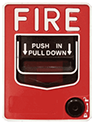Video MGMT System
 Access Control
Access Control
Voice & Data Wiring
 Burglar Alarm
Burglar Alarm
 Fire Alarm
Fire Alarm
Video MGMT System
Voice & Data Wiring
THOUGHT CENTER > Blog > Security Cameras
December 8, 2023
No time to read? Here’s a Summary:
There’s a long-standing debate over the value of wired and wireless cameras for home security applications. But in a world where businesses are four times more likely to be burglarized than homes, the debate is over. Your security infrastructure is what stands between your business and the wrongdoers of the world.
If you’re interested in commercial-grade surveillance and want to make sure your system is optimized for reliable performance, today is your lucky day.
That’s because we’re about to cut through the wired vs. wireless debate noise to arrive at the clear answers you need. Keep on reading to understand why you’d choose one method for video data transmission over the other and which one provides the dependability and data security your business needs.
Wired, or “cabled,” security cameras are touted for their reliability and performance. Here's why they're the go-to choice for business and organizational security.
Wired security cameras are the bedrock of a robust security system. They're connected via cables, which means they're not subject to the whims of Wi-Fi signals or the fickleness of wireless transmission.
When it comes to picture quality, wired cameras are clear winners.
By transmitting data over physical cables, they handle the heavy lifting of high-resolution data transmission without taking breaks or giving up entirely. The result? Crystal-clear images that leave little room for ambiguity during both proactive, real-time monitoring and investigative incident reviews.
Wired systems are a tough nut to crack. Because they transmit data from cameras to recording devices over closed internal networks, they aren’t easily disrupted by hackers and other cybercriminals.
Despite the clear case for security camera cabling, there are commercial scenarios where wireless security cameras may be the right—or, indeed, the only—option.
In the fast-paced world of business, rapidly transferrable surveillance devices are often necessary.
For temporary setups, events, or rental spaces where permanent installation isn’t desirable, wireless cameras can be a sensible choice.
For businesses (and homes) in historic buildings, drilling into century-old walls is a big no-no.
In such cases, wireless cameras are a non-invasive surveillance alternative that preserves the integrity of historical and aesthetic structures while providing the same level of deterrence and some, albeit imperfect, security footage.
Further, SD cards, portable hard drives, and USB drives can be attached to most wireless cameras for data storage when Wi-Fi is down or transmission signals are weak. These tools allow end users to access untransmitted data after the fact to fill in footage gaps.
Sometimes, the lay of the land throws a curveball, and you may find yourself needing to monitor areas where proper cabling isn’t achievable. Wireless cameras can bridge gaps where hardwiring isn’t possible.
When time is of the essence and surveillance needs are immediate—think sudden operational changes or emergency setups—wireless cameras are quick interim solutions while proper cabling is being installed.
You can think of wireless cameras as the nomads of the surveillance world. They set up camp where they're needed without setting down roots.
For small mom-and-pop shops and homeowners on a budget, wireless cameras can be attractive. They’re more budget-friendly than their cabled counterparts, and they grant businesses with low-level security needs many of the benefits of hardwired camera systems, including deterrence of unwanted behavior.
If you find yourself in a scenario where wireless data transmission is the most sensible (or only) choice, don't hesitate to reach out to the expert installers at Mammoth Security.
Let's switch gears and explain the downside of wireless surveillance. Wireless camera systems offer convenience and flexibility, but those very traits create several chinks in their armor.
Wireless cameras are at the mercy of their Wi-Fi signal strength. One gust of interference can stop data transmission instantly. Signal drops and slow data transmission are not only unprofessional but also leave businesses with security blind spots at critical moments.
If you’re collecting high-resolution footage with your cameras, you’ll have a lot more data to send over Wi-Fi. And Wi-Fi systems don’t have the bandwidth to quickly transmit nearly as much data as good old cabling.
With ever-looming cyber threats like hacking, Wi-Fi data transmission creates risks that businesses shouldn’t accept.
While wireless cameras boast easy installation, they often come with hidden costs. The need for frequent troubleshooting or add-ons like signal boosters and in-camera data storage devices, plus the heightened vulnerability to security breaches, can quickly turn your budget-conscious choice into a runaway train hurtling toward the canyon of costly consequences.
Wired camera systems offer a level of reliable, secure data transmission that wireless systems simply cannot match.
It's not that wireless cameras don't have their place—they do—but when it comes to safeguarding your business, hardwired data transmission is almost always your best option.
If you're ready to fortify your business with a security system that stands the test of time, reach out to the crew at Mammoth Security.
Just click to contact us and fill out the form that appears. We want to set you up with an expert from our team for a free, zero-obligation site survey and consultation.
NOT COMPLETELY SURE?
860-748-4292In the world of business security, wired security cameras are superior to wireless ones due to their reliability and robust performance. They provide a secure, closed network for data transmission that’s less susceptible to interference and cyber threats than Wi-Fi–dependent wireless cameras.
The benefits of wired over wireless security cameras include consistent reliability, superior image quality (due to high-resolution data transmission capabilities), and a closed network for data transmission that avoids external cyber threats.
Yes, wireless security cameras can function without Wi-Fi by utilizing alternative storage options, such as SD cards, portable hard drives, or USB drives, to store untransmitted footage.
Wireless security cameras may be considered for commercial use in scenarios where flexibility is key—such as temporary setups and surveillance in historical buildings (where cabling installation would require drilling and other invasive changes).
Wireless security cameras pose a risk for businesses because of data bandwidth limitations, vulnerability to Wi-Fi signal interference, and heightened risk of security breaches resulting from data blind spots.
For historical buildings, non-invasive surveillance solutions like wireless security cameras are ideal as they preserve structural integrity while still providing deterrence and a level of surveillance.
The image quality of wired cameras is generally superior to that of wireless cameras, as they can handle the transmission of high-resolution video without the constraints of Wi-Fi bandwidth.
Wired security cameras offer cybersecurity advantages by transmitting data over a closed network, significantly reducing the risk of hacking and cyber-attacks compared to wireless cameras that rely on Wi-Fi.
The hidden costs associated with wireless security cameras can include the need for additional equipment like signal boosters, frequent troubleshooting, and the potential for increased security breaches.
Signal boosters can improve wireless camera performance by enhancing Wi-Fi signal strength, which is crucial for maintaining consistent data transmission and avoiding security blind spots.